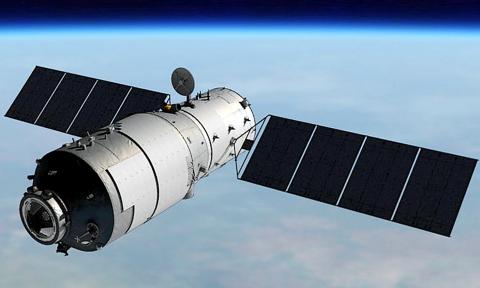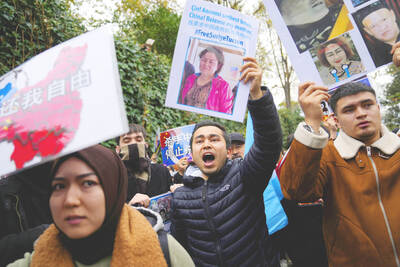China’s Tiangong-1 space station is predicted to fall to Earth this year. According to analysis by the European Space Agency (ESA), the estimated break-up zone will include Taiwan. The National Space Organization (NSPO) on Tuesday confirmed it has already started running trajectory modeling software and will use the precise calculations to determine the exact re-entry location of the space station.
China, which has already terminated its data link with Tiangong-1, has previously said it expects the space station will fall back down to Earth sometime this year, while according to the latest information released by the ESA, the re-entry corridor for any debris from Tiangong-1 will be below 43 degrees north latitude or above 43 degrees south latitude: This area includes Taiwan, New York and Tokyo.
According to NSPO deputy director Yu Hsien-cheng, any satellites for which communication has been lost, or which it is impossible to reestablish control over, are classified as space debris and will continue to move on their original orbits while slowly falling back down to Earth. However, Yu says that the time this will take is uncertain: It could take a long time, or a relatively short time. As for Taiwan, its Formosat-3 and Formosat-5 satellites are currently still in service, while Formosat-1 and Formosat-2 have already been decommissioned. Of the four satellites, Formosat-1, which was decommissioned in 2004, is still orbiting in space and has yet to fall back to Earth.

Photo: Screengrab
照片:截圖
Yu says that the majority of Taiwan’s satellites are fairly lightweight and will therefore burn up as they re-enter the Earth’s atmosphere. However, China’s Tiangong-1 space station weighs several metric tonnes and, after passing through the Earth’s atmosphere, may not completely burn up, with the danger of some fragments of debris falling to Earth. Yu says it will be extremely difficult to predict the volume, size and location of any falling debris. As such, at this stage all countries are monitoring the situation and the NSPO is using computer modeling software to continue to obtain the latest information on Tiangong-1. If the re-entry corridor is confirmed as extending to Taiwan, the NSPO will be able to react and manage the situation, says Yu.
(CNA, translated by Edward Jones)
中國太空站「天宮一號」預計今年將墜入地球。根據歐洲太空總署分析,預期的碎片落點範圍將包含台灣。國家太空中心週二證實,已啟動軌道模擬軟體,將會透過精密計算,以掌握太空站的確切落點。
中國日前已終止與太空站「天宮一號」之間的數據連結,並表示太空站預計將於今年墜入地球,而根據歐洲太空總署日前發布的資訊,「天宮一號」殘骸的落點範圍將落在南緯四十三度至北緯四十三度之間,其中包含台灣、紐約、東京等地。
國家太空中心副主任余憲政指出,失去聯繫或無法再掌握的衛星會被歸類為「太空垃圾」,將持續在原有軌道運行,並慢慢墜落地球,但時間不一定,可能很長可能很短。以台灣來說,目前福爾摩沙衛星三號、五號還在服役中,而福衛一號,福衛二號已經除役,其中,福衛一號於二○○四年除役後,至今還在太空中,尚未墜落。
余憲政表示,台灣的衛星大多重量不重,所以墜落時經過大氣層就會燒毀。然而,中國的天宮一號重達數噸,通過大氣層後,不但恐無法完全燒毀,還會裂成碎片墜落地面,很難準確預測碎片數量、大小及位置。因此,現階段各國都在關注此情況,國家太空中心則透過電腦模擬軟體運作,持續掌握天宮一號的最新資訊,以確保碎片落點擴及台灣時,能立即反應處理。
(中央社)

Oxford University Press (OUP) will no longer publish a controversial academic journal sponsored by China’s Ministry of Justice after years of concerns that several papers in the publication did not meet ethical standards about DNA collection. A statement published on the Web site of Forensic Sciences Research (FSR) states that OUP will stop publishing the quarterly journal after this year. FSR is a journal that comes from China’s Academy of Forensic Science, an agency that sits under the Ministry of Justice. The academy describes FSR as “the only English quarterly journal in the field of forensic science in China that focuses on

The traditional five-day workweek was introduced around a century ago and has since become the standard, along with punching in at 9am and leaving at 5pm. Recently, however, challenges to this formula have been increasing, particularly among young people. In the UK, 200 British companies have changed gears and decided to adopt a permanent four-day workweek for their employees. The new schedule will not cause any loss in pay, which is expected to result in greater employee satisfaction. Among those leading the charge for the new model are charities, marketing firms, and technology companies. Advocates of the policy say

A recent medical malpractice case involving a physician trained abroad has once again placed BoBo Doctors under public scrutiny. This incident has revived concerns about the quality of healthcare in Taiwan and highlighted ongoing debates regarding the legitimacy and impact of these doctors in the medical field. The term “BoBo Doctors” refers to Taiwanese students who fail to gain entry into domestic medical programs and instead pursue medical degrees in countries like Poland and other Eastern European nations. Not until they return to Taiwan do they attempt to qualify as practicing doctors by relying on their foreign qualifications to

Continued from yesterday(延續自昨日) https://www.taipeitimes.com/News/lang According to supporters, a four-day workweek is an effective way for companies to attract and keep employees. Productivity can even be improved by achieving the same output in fewer hours. The primary workforce of the future, adults between the ages of 18 and 34, are strong supporters of this pattern. More than three-quarters of them believe a four-day workweek will become common practice in five years, while 65 person say they reject a return to full-time office work. This group considers mental health and general well-being as their top priorities, and it seems certain that they will be